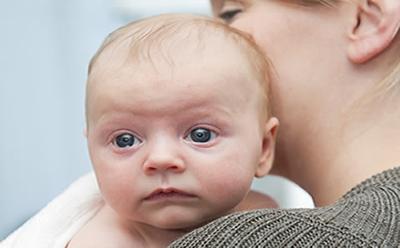Eating peanut in early years helps reduce the risk of peanut allergy even with later abstinence

Southampton researchers are part of a study that has found the early introduction of peanut to the diets of infants at high-risk of developing peanut allergy, significantly reduces the risk of peanut allergy until six years of age, even if they stop eating peanut around the age of five.
The LEAP-On study, published today in the New England Journal of Medicine and led by King’s College London, the University of Southampton and Immune Tolerance Network, is an extension of the LEAP (Learning Early About Peanut Allergy) study, which showed that the majority of infants at high-risk of developing peanut allergy are protected from peanut allergy at age five years if they eat peanut frequently, starting within the first 11 months of life.
LEAP-On asked whether those infants who had consumed peanut in the LEAP study would remain protected against peanut allergy if they then stopped eating peanut for 12 months. The study found that the early introduction of peanut protects against the development of peanut allergy, and such protection is sustained even when peanut is no longer consumed for 12 months.
Co-investigator Graham Roberts, Professor and Honorary Consultant in Paediatric Allergy and Respiratory Medicine at the University of Southampton and Southampton General Hospital said: “These studies have given us interesting results. For many years, guidelines and paediatricians have recommended that infants avoid peanut. However, The LEAP study showed that early, sustained consumption of peanut is safe and results in a substantial and significant reduction in the development of peanut allergy and now through the LEAP-On study we can show that this protection is continued for a further year.
“It is now time for us to re-consider the advice we are giving parents about when peanuts should be introduced into the diets of young children.”
The LEAP-On study was undertaken at Evelina London Children’s Hospital, and enrolled 550 participants from LEAP (out of a total of 628). All participants were instructed to avoid peanut for 12 months after they had completed the LEAP study, regardless of whether they had been randomized to avoid or eat peanut on the LEAP study. At the completion of LEAP-On, a rigorous clinical assessment of peanut allergy was made by oral peanut challenge. Additional peanut allergy assessments were made by questionnaire, skin prick test (SPT), and peanut-specific immune markers IgE and IgG4 were also measured in participants bloodstream.
The study found that at six years (72 months), there was no statistically significant increase in allergy after 12 months of avoidance, in those who had previously consumed peanut during the LEAP trial (3.6 per cent (10/274) at 60 months versus 4.8 per cent (13/270) at 72 months). The study also found that peanut allergy was significantly more prevalent in those who had avoided eating peanuts in LEAP, than those who consumed (18.6 per cent vs 4.8 per cent).
The authors were therefore able to conclude that in infants at high-risk for allergy in whom peanut was introduced in the first year of life, and continued until age five, a 12-month period of peanut avoidance was not associated with a significant increase in peanut allergy. Overall, the study saw a 74 per cent relative reduction in the prevalence of peanut allergy in those who consumed peanut compared to those who avoided.
Lead author, Professor Lack, presented the findings at the American Academy of Allergy, Asthma and Immunology meeting (AAAAI). “The aim of our study was to find out whether infants who had consumed peanut in the LEAP study would remain protected against peanut allergy after they stopped eating peanut for 12 months. LEAP-On clearly demonstrates that the majority of infants continued to be protected and that this effect was long-lasting,” he said.
“The longer term effects of stopping eating peanut following introduction early in life are not known, and further studies are needed. Parents of infants and young children with eczema and/or egg allergy, who are considered to be high-risk for peanut allergy, should consult with an Allergist, Paediatrician, or their General Practitioner prior to feeding them peanut products.”
Co-investigator, Dr George Du Toit, consultant in Paediatric Allergy at Evelina London Children’s Hospital and Honorary Reader in Paediatric Allergy, King’s College London, said: “We need more research to better understand the mechanisms behind the development and prevention of allergic responses to peanut, and how this might translate to other food allergies. However, it is reassuring that the highly protective intervention demonstrated in LEAP was not only safe, nutritionally favorable, and acceptable to participant families but also sustained even with cessation of peanut consumption for 12 months.”
The incidence of food allergy has risen in recent decades, and peanut allergy now affects up to 1 in 50 school age children in the UK; the occurrence of peanut allergy has more than doubled in the last 10 years in the UK and North America. It affects between 1 – 3 per cent of children in Western Europe, the USA, and Australia and in recent years has become an important cause of food allergies in African and Asian countries. Peanut allergy develops early in life, is rarely out-grown and there is currently no cure. It imposes a considerable burden, impacting negatively on quality of life for patients and their families.
The authors caution that the LEAP study design did not allow a determination of the minimum frequency or amount of peanut consumption required in early childhood to prevent an allergic response to peanut. Further studies are planned to establish whether the effects of early-life peanut consumption followed by ad-lib consumption of peanut over many years maintains this protection against allergy.